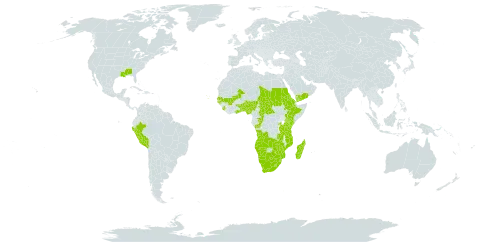Plants (50–)70–120(–150) cm. Corms tunicate, (15–)20–30 mm diam.; tunic layered, brown, brittle, cartilaginous, outer layer becoming irregularly broken to fibrous, usually bearing numerous tiny cormlets basally. Stems simple. Leaves contemporary with flowering stem [foliage leaves borne later on separate shoots], 4–6(–7), at least proximalmost 2 ± basal, distalmost 1–2 cauline, ± sheathing, ± 1/2 length of spike; blade narrowly lanceolate to ± linear, (5–)10–20(–30) mm wide, midribs and margins notably thickened. Spikes (2–)3–7(–14)-flowered, secund; sheaths subequal, (2.5–)4–7 cm, inner slightly shorter than outer, apex sometimes dry, pale. Flowers unscented; perianth tube ± cylindrical, curving outward in distal 1/2, (25–)35–45 mm; tepals red to orange with yellow mark on outer 3 tepals (or yellow to greenish and often with red to brown streaks on inner tepals), unequal, inner 3 tepals broadly elliptic, dorsal tepal horizontal to downcurved, 35–50 mm, to 22–30 mm wide, inner lateral tepals usually curving outward distally, ± equaling dorsal, outer 3 tepals curving downward, 20–25(–30) mm, outermost tepal somewhat longer and narrower than outer lateral tepals; filaments ca. 25 mm; anthers 12–16 mm; style branching near apex of anthers; branches (4–)5–6 mm. Capsules ellipsoid to ovoid, (18–) 25–35 × 12–14 mm. Seeds broadly winged, 8–12 × 5–9 mm; seed coats light brown, glossy.
More
Cormous geophyte, up to 1.5 m high. Leaves 4-6(7), blade narrowly ovate to linear. Flowers: in a 3-8-flowered spike; anthers 12-16 mm long, yellow to brownish; perianth 65-100 mm long, tube shorter or ± as long as upper lobe, lobes well developed, dorsal segment 35-50 x 22-30 mm, horizontal and hooded over stamens, variously coloured; Nov.-Feb.
